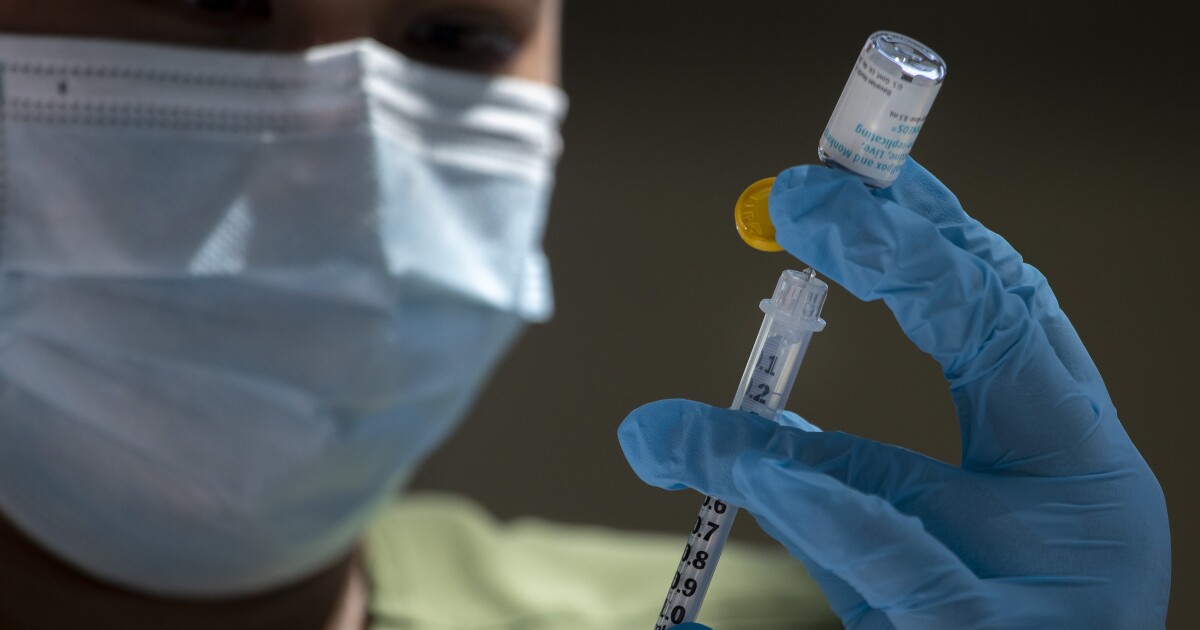
New monkeypox cases are starting to flatten in Los Angeles County, echoing a trend seen elsewhere as more vaccination doses are distributed and some people are reducing riskier sexual activity.
As of Thursday, L.A. County reported 1,349 cumulative monkeypox cases, up 30% from the prior Thursday’s tally of 1,036 cases.
The percentage increase is much smaller than in past weeks: Between Aug. 5 and Aug. 11, there was a 62% increase in cumulative cases. The prior week-over-week increase went up by 71%.
“Although a month ago we were seeing a doubling of monkeypox cases in as few as nine days, we are now seeing a leveling in the number of new cases per week. And our doubling time has increased to 16 days,” said Dr. Rita Singhal, chief medical officer for the L.A. County Department of Public Health.
“This may be an early indication that transmission is beginning to slow. Similar trends are being noted in countries where the outbreak first began, and in other jurisdictions across the United States,” Singhal said.
In late July and early August, L.A. County was seeing new monkeypox cases increase by about 50% every week, according to a Times analysis. But by mid-August, new cases stabilized, with an additional 300 cases reported per week.
If L.A. County had continued to see a 50% increase in monkeypox cases every week in August, by now, it would be seeing nearly 700 cases a week.
Nationally, as of Thursday, there were 16,603 cumulative monkeypox cases, a week-over-week increase of 23%, but that is more modest than the previous week-over-week change of 30%.
Globally, there were 45,535 cumulative monkeypox cases as of Thursday, up 15% over the prior week. That’s a softer increase than the prior week-over-week change of 24%.
There are a few possible factors for the apparent slowdown in cases. Monkeypox requires prolonged close contact to spread — typically intimate skin-to-skin contact — and is nowhere nearly as transmissible as the coronavirus.
“When you have an infectious agent like that, it is going to what we call ‘burn out’ faster when it’s out in a community or among a group of people,” Singhal said during a briefing Thursday.
The disease is characterized by a virus-filled rashes and lesions that can look like pimples, bumps or blisters. It can appear first in the genital area and rectum before spreading to other parts of the body, and because the rashes can be mistaken for other skin issues, the virus can easily spread during intimate encounters. Risk is higher for people with multiple sexual partners.
Changes in behavior among those more at risk of monkeypox may also have played a role, she said, as has the continued rollout of vaccines. Singhal said survey data from Emory University suggest that gay and bisexual men are decreasing riskier sexual activity in light of the outbreak.
“We’re being cautiously optimistic that this is going to be real and that it will hold,” Singhal said. “I can say, for us here in L.A. County, it’s leveling off. I would not say that it’s decreasing yet.”
During Thursday’s news briefing, Troy Masters — publisher of the Los Angeles Blade, an LGBTQ newspaper — said another factor may be at play.
“Many people have quit reporting their illness because it’s mild,” Masters said. “I’m aware of this from numerous friends. They keep an eye on it. If it gets out of control, they then contact their doctor.”
But even mild cases should be reported, because doing so better empowers public health officials to help stop further spread, said Dr. Muntu Davis, the county’s health officer.
“It really is helpful not just to think about the illness that you have but the others that may have been infected and who could potentially be prevented from getting illness with vaccination and helping us as a community really stop transmission of this illness,” he said.
San Francisco is also observing a possible flattening or decrease in monkeypox cases. Between July 29 and Aug. 4, San Francisco reported 143 new monkeypox cases. But over the seven-day period that ended Thursday, it reported 77 new cases.
More than 3,000 probable or confirmed monkeypox cases have been reported statewide, according to the latest available figures. The bulk of those have been in L.A. County and San Francisco, but San Diego, Alameda, Riverside, Santa Clara, Sacramento and Orange counties have all reported at least 100 cases.
“We ask those at high risk to be cautious about their partners and have any signs of monkeypox immediately checked out by a physician,” San Diego County Public Health Officer Dr. Wilma Wooten said in a statement this week.
Orange County health officials this week confirmed the county’s first case of monkeypox in a child, a rare circumstance even as the virus continues to spread statewide.
For the record:
10:04 p.m. Aug. 25, 2022A previous version of this story said youth illnesses made up about 2% of California’s total monkeypox cases. Juvenile cases are about 0.2% of the total.
There have been at least five other juvenile monkeypox cases in California. Still, the youth illnesses make up less than a quarter of a percent of the state’s total cases of monkeypox.
“Please remember that monkeypox is very uncommon in children,” said Dr. Regina Chinsio-Kwong, Orange County’s health officer. “It is important to note that many childhood illnesses can cause rashes. If you or your children have a new or unusual rash, please follow preventive guidance and seek medical attention from a qualified healthcare professional for further recommendations.”
In L.A. County, the median age of people with confirmed monkeypox cases remains 35. While 47 people have been hospitalized with the disease, no one has died in the county, Singhal said. Worldwide, there have been five deaths attributed to monkeypox in countries that have not historically seen monkeypox cases until this outbreak. None has occurred in the United States.
“Although we continue to see monkeypox cases, the risk of monkeypox infection in the general population continues to remain very low in Los Angeles County,” Singhal said.
There have been six monkeypox cases in Los Angeles County reported in congregate housing settings, such as homeless shelters and the jail system.
As of Friday, 46% of the cases for which geographic information is available had been reported in the health service planning area covering a central part of the county — a swath that’s home to about 12% of county residents and includes West Hollywood, Hollywood, downtown Los Angeles, Eagle Rock, Highland Park, Echo Park, Silver Lake, Los Feliz and Boyle Heights.
In L.A. County, 98% of monkeypox cases are in males. In addition, among monkeypox cases whose sexual orientation are known, 97% are occurring among people who identify as gay or bisexual, Singhal said.
The supply of vaccine has increased notably recently. Until recently, L.A. County had received more than 72,000 doses of the Jynneos vaccine. The county has distributed all of the doses to vaccine providers, and more than 48,000 doses have been administered.
In addition, L.A. County has just received more than 40,000 doses of vaccine, Singhal said. An additional 80,000 doses have been allocated to L.A. County.
Once it has fully received those 120,000 additional doses, Singhal estimates, L.A. County will be able to fully vaccinate nearly 100,000 residents with the two-dose vaccination series. That represents about 56% of the estimated 180,000 residents of L.A. County considered at higher risk for monkeypox infection, Singhal said.








